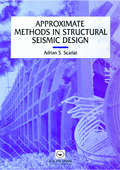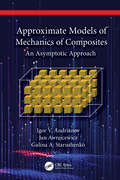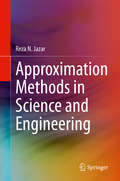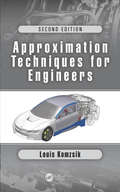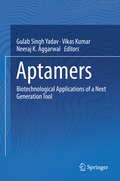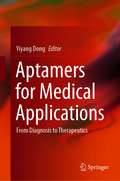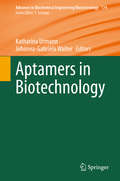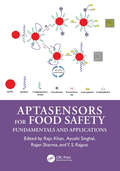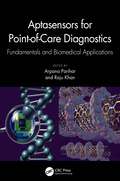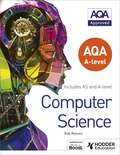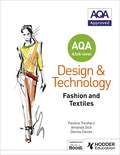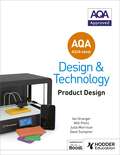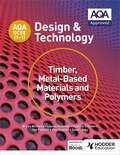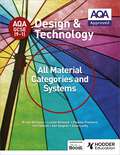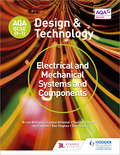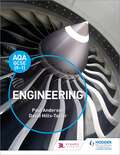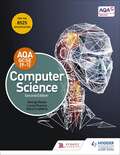- Table View
- List View
Approximate Methods in Structural Seismic Design
by A. ScarlatThis book examines the recent developments in computerized structural analysis and finite element analysis to re-appraise existing approximate techniques and to define their scope and limits more accurately. The book proposes new techniques and provides many numerical examples and comparisons with 'accurate' methods.
Approximate Models of Mechanics of Composites: An Asymptotic Approach
by Jan Awrejcewicz Igor V. Andrianov Galina A. StarushenkoApproximate Models of Mechanics of Composites: An Asymptotic Approach is an essential guide to constructing asymptotic models and mathematical methods to correctly identify the mechanical behavior of composites. It provides methodology for predicting and evaluating composite behavior in various structures, leading to accurate mathematical and physical assessments. The book estimates the error of approximations through comparing asymptotic solutions with the results of numerical and analytical solutions to gain a holistic view of the data. The authors have developed asymptotic models based on mathematical and physical rigorous approaches, which include three-phase models of fibrous composites, a modernized three-phase composite model with cylindrical inclusions, and models of two-dimensional composites of hexagonal structure. Also covered are two-phase models of composites related to the Maxwell formula and a percolation transition model for elastic problems based on the self-consistency method and Padé approximations. By obtaining analytical expressions to effectively characterize composite materials, their physical and geometric parameters can be accurately assessed. This book suits engineers and students working in material science, mechanical engineering, physics, and mathematics, as well as composite materials in industries such as construction, transport, aerospace, and chemical engineering.
Approximation Methods in Science and Engineering
by Reza N. JazarApproximation Methods in Engineering and Science covers fundamental and advanced topics in three areas: Dimensional Analysis, Continued Fractions, and Stability Analysis of the Mathieu Differential Equation. Throughout the book, a strong emphasis is given to concepts and methods used in everyday calculations. Dimensional analysis is a crucial need for every engineer and scientist to be able to do experiments on scaled models and use the results in real world applications. Knowing that most nonlinear equations have no analytic solution, the power series solution is assumed to be the first approach to derive an approximate solution. However, this book will show the advantages of continued fractions and provides a systematic method to develop better approximate solutions in continued fractions. It also shows the importance of determining stability chart of the Mathieu equation and reviews and compares several approximate methods for that. The book provides the energy-rate method to study the stability of parametric differential equations that generates much better approximate solutions.
Approximation Techniques for Engineers: Second Edition
by Louis KomzsikThis second edition includes eleven new sections based on the approximation of matrix functions, deflating the solution space and improving the accuracy of approximate solutions, iterative solution of initial value problems of systems of ordinary differential equations, and the method of trial functions for boundary value problems. The topics of th
Aptamers: Biotechnological Applications of a Next Generation Tool
by Gulab Singh Yadav Vikas Kumar Neeraj K. AggarwalThe book discusses the basics of aptamers and the advent of aptamer-based technology in recent times. The book covers the diverse applications of aptamers, such as in detection of animal and plant pathogens, disease diagnosis and therapeutics, environmental contamination detection etc. Besides these applications, the book also describes the use of these synthetic or modified DNA, as drug delivery vehicles.The different chapters describe how the binding capacity and specificity of aptamers can be exploited in various ways. The book also discusses how these attributes of aptamers can outdo the antibody technology in biomedical and diagnostic solutions. This crisp and concise book gives the readers an insight into the most recent biotechnological applications of aptamers.
Aptamers for Medical Applications: From Diagnosis to Therapeutics
by Yiyang DongThis book outlines comprehensively the main medical uses of aptamers, from diagnosis to therapeutics in fourteen chapters. Pioneering topics covered include aptamer pharmaceuticals, aptamers for malign tumors, aptamers for personalized therapeutics and aptamers for point-of-care testing. The book offers an essential guide for medical scientists interested in developing aptamer-based schemes for better theranostics. It is therefore of interest for not only academic researchers, but also practitioners and medical researchers in various fields of medical science, medical research and bio-analytical chemistry.
Aptamers in Biotechnology (Advances in Biochemical Engineering/Biotechnology #174)
by Katharina Urmann Johanna-Gabriela WalterThis book reviews the development, characterization and applications of aptamers in different areas of biotechnology ranging from therapeutics to diagnostics and protein purification. Hailed as chemical antibodies, these single-stranded nucleic acid receptors were predicted to supersede antibodies in traditional assays, such as ELISA, within a short time. While this has yet to happen, readers will find in this book a deep insight into the progress of aptamer technology and a critical discussion about the limitations that need to be overcome in order to find wider acceptance and use outside of the still relatively small aptamer-community. This book covers all aspects of aptamer generation and application for the aptamer-experienced reader and curious novice alike, with the addition of an industry perspective on the future of aptamer-use in biotechnology.
Aptasensors for Food Safety: Fundamentals and Applications
by Raju Khan Ayushi Singhal Rajan Sharma Y. S RajputThis reference book provides updated knowledge on fundamentals and applications of aptasensorsin food science. It discusses aptamer selection strategies including Systematic Evolution of Ligandsthrough EXponential enrichment (SELEX), Capture SELEX, Cell SELEX, and GO SELEX strategiesfor aptasensor design involving well-studied and newly emerged nanomaterials, food analysisfocusing on its safety, aptasensing techniques relevant to detection of food pathogens, pesticides,veterinary drug residues, toxins, heavy metals, allergens, and future perspectives of aptamers infood science and technology. The book focuses on recent developments in aptasensors and their usein detection of contaminants in food. The book is an excellent resource for R&D organizationsdedicated to the development of biosensors in general and aptasensors in particular for the detectionof environmental contaminants in the food supply chain. Also, the contents of the book willbe useful to researchers, postgraduate students, analytical chemists, food scientists, and regulatoryauthorities.
Aptasensors for Point-of-Care Diagnostics: Fundamentals and Biomedical Applications
by Arpana PariharThe design and fabrication of aptamer-based biosensors for point-of-care testing of disease diagnostic and prognostic is an upthrust and interdisciplinary area of research. This book covers the design and development of novel cost-effective aptamer-based biosensors for disease diagnostic and prognostic including an understanding of health care management in terms of timely updates of disease situations in a particular geographical area. It also discusses the scaling up and market trend of aptamer-based devices for extension of research from lab to market, and end users. Features: Explains the design and fabrication of aptasensors-based diagnostic devices. Includes novel approaches and comprehensive technology overview for diagnosis management towards early-stage detection of various biomarkers associated with several health conditions. Demonstrates possible benefits of combined diagnostics and therapeutic possibilities using aptamer-based point-of-care technologies devices. Discusses emerging implications and recent advances of biosensing platforms for designing and developing aptamer-based point-of-care testing (POCT) devices. Explores aptamer-based approach to develop advanced platforms for medical applications and open arena for state-of-the-art future research. This book is aimed at researchers and graduate students in biomedical engineering, diagnostics, nanobiotechnology, and materials science.
AQA A level Computer Science
by Bob ReevesThis title has been approved by AQA for use with the new AS and A-level AQA Computer Science specifications. AQA A-level Computer Science gives students the chance to think creatively and progress through the AQA AS and A-level Computer Science specifications. Detailed coverage of the specifications will enrich understanding of the fundamental principles of computing, whilst a range of activities help to develop the programming skills and computational thinking skills at A-level and beyond. - Enables students to build a thorough understanding of the fundamental principles in the AQA AS and A-Level Computer Science specifications, with detailed coverage of programming, algorithms, data structures and representation, systems, databases and networks, uses and consequences. - Helps to tackle the various demands of the course confidently, with advice and support for programming and theoretical assessments and the problem-solving or investigative project at A-level. - Develops the programming and computational thinking skills for A-level and beyond - frequent coding and question practice will help students apply their knowledge of the principles of computer science, and design, program and evaluate problem-solving computer systems. Bob Reeves is an experienced teacher with examining experience, and well-respected author of resources for Computing and ICT across the curriculum.
AQA A level Computer Science
by Bob ReevesExam Board: AQALevel: AS/A-levelSubject: Computer ScienceFirst Teaching: September 2015First Exam: June 2016This title has been approved by AQA for use with the AS and A-level AQA Computer Science specifications. AQA A-level Computer Science gives students the chance to think creatively and progress through the AQA AS and A-level Computer Science specifications. Detailed coverage of the specifications will enrich understanding of the fundamental principles of computing, whilst a range of activities help to develop the programming skills and computational thinking skills at A-level and beyond. - Enables students to build a thorough understanding of the fundamental principles in the AQA AS and A-Level Computer Science specifications, with detailed coverage of programming, algorithms, data structures and representation, systems, databases and networks, uses and consequences.- Helps to tackle the various demands of the course confidently, with advice and support for programming and theoretical assessments and the problem-solving or investigative project at A-level.- Develops the programming and computational thinking skills for A-level and beyond - frequent coding and question practice will help students apply their knowledge of the principles of computer science, and design, program and evaluate problem-solving computer systems. Bob Reeves is an experienced teacher with examining experience, and well-respected author of resources for Computing and ICT across the curriculum.
AQA A level Computer Science
by Bob ReevesExam Board: AQALevel: AS/A-levelSubject: Computer ScienceFirst Teaching: September 2015First Exam: June 2016This title has been approved by AQA for use with the AS and A-level AQA Computer Science specifications. AQA A-level Computer Science gives students the chance to think creatively and progress through the AQA AS and A-level Computer Science specifications. Detailed coverage of the specifications will enrich understanding of the fundamental principles of computing, whilst a range of activities help to develop the programming skills and computational thinking skills at A-level and beyond. - Enables students to build a thorough understanding of the fundamental principles in the AQA AS and A-Level Computer Science specifications, with detailed coverage of programming, algorithms, data structures and representation, systems, databases and networks, uses and consequences.- Helps to tackle the various demands of the course confidently, with advice and support for programming and theoretical assessments and the problem-solving or investigative project at A-level.- Develops the programming and computational thinking skills for A-level and beyond - frequent coding and question practice will help students apply their knowledge of the principles of computer science, and design, program and evaluate problem-solving computer systems. Bob Reeves is an experienced teacher with examining experience, and well-respected author of resources for Computing and ICT across the curriculum.
AQA AS/A-Level Design and Technology: Fashion and Textiles
by Amanda Dick Pauline Treuherz Denise DaviesExam board: AQALevel: A-levelSubject: Design and TechnologyFirst teaching: September 2017First exams: Summer 2018 (AS) Summer 2019 (A-Level)Encourage your students to be creative, innovative and critical designers with a textbook that builds in-depth knowledge and understanding of the materials, components and processes associated with the creation of fashion and textile products.Our experienced author team will help guide you through the requirements of the specification, covering the core technical and designing and making principles needed for the 2017 AQA AS and A-level Design and Technology Fashion and Textiles specification.- Explores real-world contexts for fashion and textiles- Develops practical skills and theoretical knowledge and builds student confidence- Supports students with the application of maths skills to fashion and textiles- Helps guide students through the requirements of the Non-Exam Assessments and the written exams at both AS and A-level
AQA AS/A-Level Design and Technology: Product Design
by Will Potts Julia Morrison Ian Granger Dave SumpnerExam Board: AQALevel: AS/A-levelSubject: Design & TechnologyFirst Teaching: September 2017First Exam: June 2018Encourage your students to be creative, innovative and critical designers with a textbook that builds in-depth knowledge and understanding of the materials, components and processes associated with the creation of products.Our expert author team will help guide you through the requirements of the specification, covering the core technical and designing and making principles needed for the 2017 AQA AS and A-level Design and Technology Product Design specification.- Explores real-world contexts for product design- Develops practical skills and theoretical knowledge and builds student confidence- Supports students with the application of maths skills to design and technology - Helps guide students through the requirements of the Non-Exam Assessments and the written exams at both AS and A Level.
AQA AS/A-Level Design and Technology: Product Design
by Will Potts Julia Morrison Ian Granger Dave SumpnerExam Board: AQALevel: AS/A-levelSubject: Design & TechnologyFirst Teaching: September 2017First Exam: June 2018Encourage your students to be creative, innovative and critical designers with a textbook that builds in-depth knowledge and understanding of the materials, components and processes associated with the creation of products.Our expert author team will help guide you through the requirements of the specification, covering the core technical and designing and making principles needed for the 2017 AQA AS and A-level Design and Technology Product Design specification.- Explores real-world contexts for product design- Develops practical skills and theoretical knowledge and builds student confidence- Supports students with the application of maths skills to design and technology - Helps guide students through the requirements of the Non-Exam Assessments and the written exams at both AS and A Level.
AQA AS/A-Level Design and Technology: Fashion and Textiles
by Amanda Dick Pauline Treuherz Denise DaviesExam board: AQALevel: A-levelSubject: Design and TechnologyFirst teaching: September 2017First exams: Summer 2018 (AS) Summer 2019 (A-Level)Encourage your students to be creative, innovative and critical designers with a textbook that builds in-depth knowledge and understanding of the materials, components and processes associated with the creation of fashion and textile products.Our experienced author team will help guide you through the requirements of the specification, covering the core technical and designing and making principles needed for the 2017 AQA AS and A-level Design and Technology Fashion and Textiles specification.- Explores real-world contexts for fashion and textiles- Develops practical skills and theoretical knowledge and builds student confidence- Supports students with the application of maths skills to fashion and textiles- Helps guide students through the requirements of the Non-Exam Assessments and the written exams at both AS and A-level
AQA GCSE: Timber And Metal Based Materials And Polymers Whiteboard Etextbook (AQA GCSE (9-1) Design and Technology)
by Bryan Williams Louise Attwood Pauline Treuherz Dave Larby Ian Fawcett Dan HughesExam Board: AQALevel: GCSESubject: D&TFirst Teaching: September 2017First Exam: June 2019Build in-depth understanding and inspire your students to tackle design challenges both practically and creatively, with a textbook that delivers the Core Technical plus Specialist Technical and Design & Making Principles needed for the 2017 AQA D&T GCSE.The insight of our author team will build topic knowledge, including the technical principles of materials with which you are less familiar, while focusing on the specialist principles of timber, metal-based materials and polymers in more depth, to ensure you can navigate the specification with confidence whilst your students' ideas flourish.· Trusted author team of specialist teachers and those with examining experience· Build topic knowledge with learning objectives directly linked to the specification and short activities to reinforce understanding· Develop mathematical and scientific knowledge and understanding with activities that link topics to maths and science· Inspire your students as they undertake the iterative design process, with examples of imaginative design-and-make tasks, and a look at how to approach the Non-Exam Assessment· Check knowledge and understanding with end of topic summaries and practice questions for the written exam
AQA GCSE: Timber, Metal-Based Materials and Polymers (AQA GCSE (9-1) Design and Technology)
by Bryan Williams Louise Attwood Pauline Treuherz Dave Larby Ian Fawcett Dan HughesExam Board: AQALevel: GCSESubject: D&TFirst Teaching: September 2017First Exam: June 2019Build in-depth understanding and inspire your students to tackle design challenges both practically and creatively, with a textbook that delivers the Core Technical plus Specialist Technical and Design & Making Principles needed for the 2017 AQA D&T GCSE.The insight of our author team will build topic knowledge, including the technical principles of materials with which you are less familiar, while focusing on the specialist principles of timber, metal-based materials and polymers in more depth, to ensure you can navigate the specification with confidence whilst your students' ideas flourish.· Trusted author team of specialist teachers and those with examining experience· Build topic knowledge with learning objectives directly linked to the specification and short activities to reinforce understanding· Develop mathematical and scientific knowledge and understanding with activities that link topics to maths and science· Inspire your students as they undertake the iterative design process, with examples of imaginative design-and-make tasks, and a look at how to approach the Non-Exam Assessment· Check knowledge and understanding with end of topic summaries and practice questions for the written exam
AQA GCSE (AQA GCSE (9-1) Design and Technology)
by Bryan Williams Louise Attwood Pauline Treuherz Dave Larby Ian Fawcett Dan HughesExam Board: AQALevel: GCSESubject: D&TFirst Teaching: September 2017First Exam: June 2019Build in-depth understanding and inspire your students to tackle design challenges both practically and creatively, with a textbook that delivers the Core Technical plus Specialist Technical and Design & Making Principles needed for the 2017 AQA D&T GCSE.The insight of our author team will build topic knowledge, including the technical principles of materials with which you are less familiar, to ensure you can navigate the specification with confidence whilst your students' ideas flourish.· Trusted author team of specialist teachers and those with examining experience· Build topic knowledge with learning objectives directly linked to the specification and short activities to reinforce understanding· Develop mathematical and scientific knowledge and understanding with activities that link topics to maths and science· Inspire your students as they undertake the iterative design process, with examples of imaginative design-and-make tasks, and a look at how to approach the Non-Exam Assessment· Check knowledge and understanding with end of topic summaries and practice questions for the written exam
AQA GCSE: All Material Categories and Systems (AQA GCSE (9-1) Design and Technology)
by Bryan Williams Louise Attwood Pauline Treuherz Dave Larby Ian Fawcett Dan HughesExam Board: AQALevel: GCSESubject: D&TFirst Teaching: September 2017First Exam: June 2019Build in-depth understanding and inspire your students to tackle design challenges both practically and creatively, with a textbook that delivers the Core Technical plus Specialist Technical and Design & Making Principles needed for the 2017 AQA D&T GCSE.The insight of our author team will build topic knowledge, including the technical principles of materials with which you are less familiar, to ensure you can navigate the specification with confidence whilst your students' ideas flourish.· Trusted author team of specialist teachers and those with examining experience· Build topic knowledge with learning objectives directly linked to the specification and short activities to reinforce understanding· Develop mathematical and scientific knowledge and understanding with activities that link topics to maths and science· Inspire your students as they undertake the iterative design process, with examples of imaginative design-and-make tasks, and a look at how to approach the Non-Exam Assessment· Check knowledge and understanding with end of topic summaries and practice questions for the written exam
AQA GCSE (9-1) Design and Technology: Electrical and Mechanical Systems and Components
by Bryan Williams Louise Attwood Pauline TreuherzBuild in-depth understanding and inspire your students to tackle design challenges both practically and creatively, with a textbook that delivers the Core Technical plus Specialist Technical and Design & Making Principles needed for the 2017 AQA D&T GCSE.The insight of our author team will build topic knowledge, including the technical principles of materials with which you are less familiar, while focusing on the specialist principles of electrical and mechanical systems and components in more depth, to ensure you can navigate the specification with confidence whilst your students' ideas flourish.· Trusted author team of specialist teachers and those with examining experience· Build topic knowledge with learning objectives directly linked to the specification and short activities to reinforce understanding· Develop mathematical and scientific knowledge and understanding with activities that link topics to maths and science· Inspire your students as they undertake the iterative design process, with examples of imaginative design-and-make tasks, and a look at how to approach the Non-Exam Assessment· Check knowledge and understanding with end of topic summaries and practice questions for the written exam
AQA GCSE (9-1) Engineering: Aqa Gcse (9-1) Engineering Epub
by Paul Anderson Mark Griffiths David Hills-TaylorBuild a foundation of knowledge alongside practical engineering skills for the 2017 AQA GCSE (9-1) Engineering specification, inspiring your students' problem solving skills for the NEA and beyond.This accessible textbook sets out clear learning objectives for each topic, with activities to reinforce understanding and examples that will support all students with the maths and science skills needed.- Builds knowledge of materials, manufacturing processes, systems, testing and investigation methods and modern technologies- Helps students to apply practical engineering skills to design and make imaginative prototypes that solve real and relevant engineering problems- Develops mathematical understanding with clear worked examples for all equations and maths skills and questions to test knowledge- Includes guidance on how to approach the non-exam assessment (NEA) with creativity and imagination- Prepares for the written exam with advice, tips and practice questions
AQA GCSE (9-1) Engineering
by Paul Anderson David Hills-TaylorExam board: AQALevel: GCSESubject: EngineeringFirst teaching: September 2017First exams: Summer 2019Build a foundation of knowledge alongside practical engineering skills for the 2017 AQA GCSE (9-1) Engineering specification, inspiring your students' problem solving skills for the NEA and beyond.This accessible textbook sets out clear learning objectives for each topic, with activities to reinforce understanding and examples that will support all students with the maths and science skills needed.- Builds knowledge of materials, manufacturing processes, systems, testing and investigation methods and modern technologies- Helps students to apply practical engineering skills to design and make imaginative prototypes that solve real and relevant engineering problems- Develops mathematical understanding with clear worked examples for all equations and maths skills and questions to test knowledge- Includes guidance on how to approach the non-exam assessment (NEA) with creativity and imagination- Prepares for the written exam with advice, tips and practice questions
AQA GCSE Computer Science, Second Edition
by George Rouse Lorne Pearcey Gavin CraddockUpdated specification; first teaching September 2020. Specification code: 8525Written by leading Computer Science teachers, this textbook will guide students through the updated AQA GCSE Computer Science specification topic by topic, and provide them with standalone recap and review sections, practice questions, worked examples and clear explanations of complex topics.This textbook:>> Prepares students for assessment with numerous practice questions for all topics>> Develops computational thinking skills>> Provides differentiated material with the 'beyond the spec' feature>> Includes standalone recap and review sections at the end of each chapter>> Provides definitions of technical terms, along with a glossary of words to ensure students feel confident with the assessment.AuthorsGeorge Rouse, Lorne Pearcey and Gavin Craddock are highly respected and widely published authors of resources.
AQA GCSE Computer Science, Second Edition
by George Rouse Lorne Pearcey Gavin Craddock Ian PagetUpdated specification; first teaching September 2020. Specification code: 8525Written by leading Computer Science teachers, this textbook will guide students through the updated AQA GCSE Computer Science specification topic by topic, and provide them with standalone recap and review sections, practice questions, worked examples and clear explanations of complex topics.This textbook:>> Prepares students for assessment with numerous practice questions for all topics>> Develops computational thinking skills>> Provides differentiated material with the 'beyond the spec' feature>> Includes standalone recap and review sections at the end of each chapter>> Provides definitions of technical terms, along with a glossary of words to ensure students feel confident with the assessment.AuthorsGeorge Rouse, Lorne Pearcey and Gavin Craddock are highly respected and widely published authors of resources.
